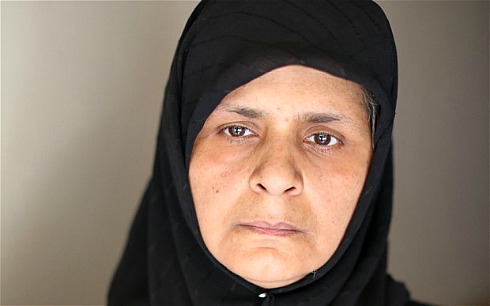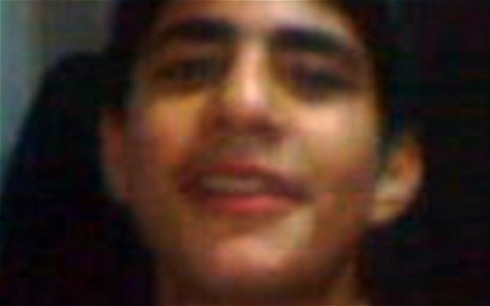Archives
AND MORE...

Aiding Savagery
_____________________

Pure, Unadulterated Evil
_____________________

A Culture Of Savagery
_____________________

A Vulture Fest
_____________________

Chock Full o'Nuts
_____________________
June 23, 2013
Savages, Victims & Enablers
Sickening, horrific and heartbreaking are just some of the words that spring to mind when reading the piece below. Nadia Umm Fuad watched her son being shot by Islamist "rebels" in Syria after the 14-yr-old mentioned the Prophet Mohammed, as he joked with a customer at his coffee stall in Aleppo.
These savages, i.e., "rebels," are the ones the civilized world is directly or indirectly arming today. Nadia and her son are the victims. Are we (i.e., the so-called civilized world) the enablers?
As we’ve written repeatedly on these pages (e.g., see here, here, here and here), the Arab/Muslim Middle East is and always has been a culture of savagery.
Of course that's NOT to say that all Arabs/Muslims are savage or bad. But it is to say there's something about their culture or belief system that allows such savages to flourish and operate in their midst.
Look at Iraq and Afghanistan today. What more does one need in order to understand that trying to win over hearts and minds of people who don’t want to be won over is a costly exercise in futility?
The only way to change a murderous belief system/ideology that also threatens our own security, is to QUASH it decisively i.e., in a way that leaves little room for debate over who won and who lost.
Telegraph.co.uk | June 22, 2013
Syria: 'I saw rebels execute my boy for no more than a joke'
Nadia Umm Fuad watched her son being shot by Islamist rebels in Syria after the 14-year-old referred to the Prophet Mohammed as he joked with a customer at his coffee stall in Aleppo. She speaks to Richard Spencer.
By Richard Spencer, Aleppo

Nadia Umm Fuad who watched her son being shot by Islamist rebels in Syria after the 14-year-old referred to the Prophet Mohammed as he joked with a customer at his coffee stall. Photo: Will Wintercross
Mohammed Katta's mother witnessed the execution of her son in three stages.
She was upstairs at home when she first heard the shouting. The people of the neighbourhood were yelling that "they have brought back the kid", so she rushed out of her apartment.
"I went out on my balcony," Nadia Umm Fuad said. "I said to his father, they are going to shoot your son! Come! Come! Come! I was on the stairs when I heard the first shot. I was at the door when I heard the second shot.
"I saw the third shot. I was shouting, 'That's haram, forbidden! Stop! Stop! You are killing a child.' But they just gave me a dirty look and got into their car. As they went, they drove over my son's arm, as he lay there dying."
Mohammed was 14 when he was killed, earlier this month, prompting international condemnation. He has become a symbol of the fears many Syrians have for the future of a country where jihadists are vying with the regime for control.
He is a counterweight – the comparison was Nadia Umm Fuad's – to Hamza al-Khatib, the 13-year-old from Deraa in southern Syria returned by regime troops to his parents battered, genitals removed, kneecaps smashed, burned and with three gunshot wounds, early in the uprising.
Mohammed was working at the family's coffee stall in the Shaar district of Aleppo when he made a fatal mistake. Pressured by a customer to hand over a coffee on promise of payment, he shouted good-humouredly: "I wouldn't give the Prophet Mohammed credit if he came here today." He was overheard by two men on the opposite corner. Marching over, they whisked him away in a car, ignoring his protestations of his love for the Prophet and the objections of a militiaman from the Free Syrian Army nearby. Half an hour later, they returned. According to Mohammed's younger brother and the neighbours, he was staggering and fell to his knees, and had clearly been beaten. A bag had been placed over his head.

Mohammed Katta who was shot by Islamist rebels in Syria.
"I heard them say, 'People of Aleppo and people of Shaar! Anyone who curses God is given three days to repent. Anyone who curses the Prophet is killed immediately'," Nadia Umm Fuad said.
The murder of Mohammed, a drummer boy in the revolution's early protest marches, has shocked even the battle-hardened people of Aleppo. It is easy for some to blame, as they do, the regime for inserting spies behind rebel lines to carry out atrocities to discredit the rebels.
But the killing, to many, only confirms what they already know: that a wild and untamed version of the most militant Islamist credos has entered the conflict. Jabhat al-Nusra, the local affiliate of al-Qaeda, has issued a statement condemning the death and denying responsibility.
Jabhat al-Nusra, though, is no longer the most militant group operating in Aleppo, strange though that sounds.
The group has split between a largely local faction, which believes its mission is simply to rid the country of President Bashar al-Assad and implement Islamic rule, and a group swearing loyalty to the region's most brutal al-Qaeda version, the Islamic State of Iraq and al-Sham, whose leader Abu Bakr al-Baghdadi has tried to merge both countries' branches.
Many foreign jihadists are loyal to the latter. Others have formed their own battalions, such as Jaish Muhajireen wa Ansar, led by a Chechen. Nadia Umm Fuad thinks it was foreign fighters who killed her son, as they spoke classical Arabic rather than the local dialect.
She said Aleppo had changed in the past two months. "We didn't have any problems when the FSA controlled Aleppo," she said. "There are so many groups now, that we don't know who is in charge." Islamist brigades including both Jabhat al-Nusra and others loyal to the Revolutionary Military Council, backed by the West, have set up a Sharia court. Its director, Abu Ammar, said it was investigating Mohammed's killing. But it does not know who was responsible.
He added that the law forbade vigilante justice; all those accused must be brought before a court and allowed to speak.
Whether too frightened, or too dazed by his beating, Mohammed never had that opportunity. From the moment he was taken away, to the moment he was killed, he was heard to say nothing.
"I saw my son, and saw him dead, and saw a fountain of blood coming out of him," his father, Abdulwahab Katta, said. "I too said nothing. I was mute."
Original article here.
Log In »
Notable Quotables
"Mr. Netanyahu is one of the most media-savvy politicians on the planet. On Friday he appeared live via video link on 'Real Time with Bill Maher,' taking the host’s alternately sardonic and serious line of questioning with gazelle-like alacrity."
~ Anthony Grant, jourrnalist who has written for many major newspapers and worked in television at Paris and Tel Aviv, interviewing former PM Benjamin Netanyahu on Monday, at the outset of Mr. Netanyahu's new book (more here).


